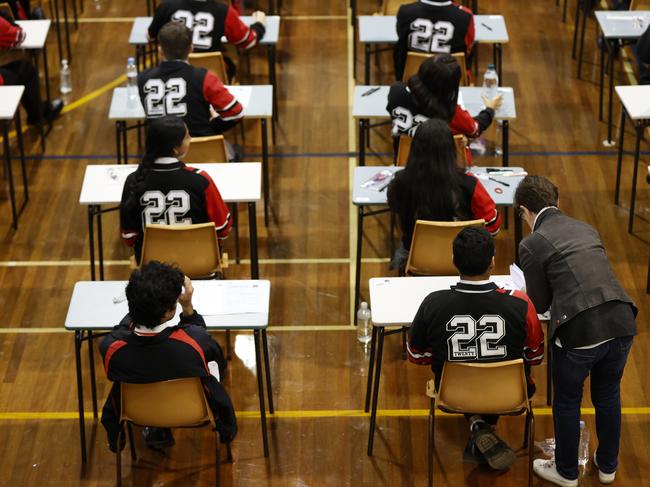Opinion: Australia’s ‘whole language’ approach to English failing kids
Don’t blame teachers or text-message culture – here’s why Australian students can’t grasp the basics of English, writes Paul Williams.

Opinion
Don't miss out on the headlines from Opinion. Followed categories will be added to My News.
I have received piles of hate mail in my 20-plus years as a newspaper columnist.
Much of it is toxic bile from those who champion free speech but who insist on preventing me from expressing an opinion.
A few letters are amusing; many make no sense at all.
But I’m more shocked by the inability of so many correspondents to spell and punctuate their missives to even the most basic level of English – so much so that I no longer read their attempts.
My fears for the future of our language were confirmed recently when I read an Australian Education Research Organisation report into Australia’s NAPLAN school results.
That report found Australian schoolchildren’s literacy levels (especially their ability to punctuate) had declined significantly over the past decade, with three-quarters of Year 9 students hardly improving their writing skills since Year 3.
Indeed, the vast majority of 14 to 15-year-old Australian students have no idea about punctuation outside of capital letters and full stops.
Yes, a colon is more than the bowel, and a semicolon is not the result of surgery.
I can hear the naysayers now: “Why should kids waste their time with spelling and punctuation when word processors auto-correct? Besides, kids should be learning coding, not commas.”
Perhaps, but spellcheck programs are culturally specific, and the language of technology is still a written one demanding precision.
Think of the dangers of pharmacists misspelling drug names, or of civil engineers being unclear in their bridge-building instructions.
Indeed, meaning itself is too often predicated upon those annoying little squiggles we call punctuation.
There’s a huge difference, for example, between telling your beloved, “I’m sorry; I love you” and, “I’m sorry I love you.”
Try it on your other half if you doubt me.
So, what’s caused this decline? Is it simply a text message culture?
First, teachers are not the primary problem.
They must follow the curriculum set down for them – one that has de-emphasised the rules of language structures in the name of a “whole language” approach that, since the 1980s, has taught reading and writing holistically.
Of course, “whole language” has a role.
After all, children learn to speak by listening to familial conversations in real-life contexts, not by studying words in isolation.
But we don’t learn number facts casually by osmosis. We learn them only via the rules of arithmetic followed by regular practice.

Thirty years ago, as a primary classroom teacher, I was frustrated at my own students’ inability to grasp basic spelling and punctuation.
As a child, I had learnt much about language structure from my own teachers’ dictation lessons.
Sadly, the “whole language” approach rejects such strategies as “artificial”.
But, in frustration, I turned to dictation.
The improvements in children’s spelling, punctuation and grammar were both enormous and immediate.
Importantly, the children loved it – a fact that reminds us how students themselves can learn that precise language matters, and that to self-improve one’s language is actually to self-empower.
Even so, the research also reveals that too many classroom teachers are not confident in their own grammar and punctation skills.
Again, this is not their fault: their own schooling was lacking in these areas, and university teacher education curriculum has not adequately equipped student teachers for this role.
But declining standards of classroom discipline appear to be a bigger issue.
Indeed, Australian classrooms are now among the most chaotic in the world, with a 2018 OECD report ranking us 70th among 77 nations. Put simply, children cannot learn in loud and disruptive environments, and especially not when teachers are obliged to interrupt lesson to quieten noisy students.
Sadly, teachers’ ability to control disruptive classrooms is too often undermined by entitled ‘Karen’ parents who storm principals’ offices insisting their Little Johnny is not undisciplined but merely “special”.
The teaching-learning equation for successful outcomes is therefore a complex one.
It requires both the political will of education ministers to oversee change, and professional and cultural co-operation of other stakeholders to effect that change.
But it can be done.
If state education departments revise curriculums to emphasise written language structures, if they also empower school principals to introduce tighter classroom management practices, and if university teacher-training courses reflect these changes, then we are halfway to reversing our crisis of literacy.
The other half of the journey, of course, is travelled by parents.
But if they are unwilling to invest in their kids’ future, then the equation amounts to zero.




